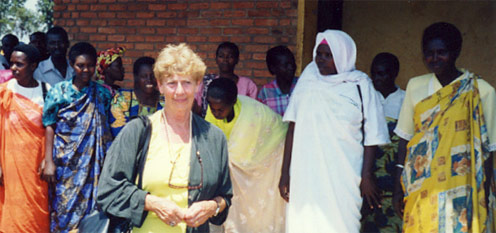












 |
|||||
|
Find information about submitting your own widow story or to contribute to WidowSpeak in other ways. Print this story Download a PDF version to print Poetry Storybank |
|||||
 |
|||||
| Margaret Owen with widows of Rwanda | |||||
| Widowhood Changed The Way I Looked At Human Rights |
|||||
| by Margaret Owen © Margaret Owen – 2005 | page 1 | 2 | ||||
|
|
|||||
| DATE: 11/15/05 ORIGIN: EUROPE / U.K. | |||||
| In all the years I worked as an international lawyer in areas of women’s status—immigration and asylum, family planning and abortion rights, education and employment issues—I had never once considered the position of “widows.’’ Like so many people, especially in the West, the word “widow” conjured up a picture of a meek little grey-haired old lady, sitting discreetly and patiently behind lace curtains, knitting for her grandchildren and generally looked after by, and looking after, her happy surrounding family. So it was a great shock to me when at the age of 58 I suddenly found myself widowed. I experienced for the first time the mild, subtle but definite discrimination that exists in my generation and my class towards women who have lost a husband. No longer was one asked to dinner parties; people crossed the road rather than have to face talking to someone so recently associated with a death; if I did get invited out it was to take pot-luck in the kitchen with the children and grandmothers—never to a social occasion where only couples and single men could be accommodated. How different for men! Widowers, on the contrary, were “lionized," chased, collected and invited everywhere. Invariably, English widowers get married fairly quickly after bereavement, to women often young enough to be their daughters. Whilst we older widows have little chance of finding a new partner. But all these small tribulations were bearable, for I had heaps of women friends and interesting work to do. I was lonely, of course, for my husband died just when my children had left home but before they were old enough to have families of their own. In 1990, my youngest son was still a student, and all four children were still struggling to find their chosen careers and their own fulfillment. I could hardly imagine that one day I would be the proud grandmother of seven grandchildren. Nor that I would discover suddenly a whole new career and way of life opening up for me to last, I believe, 'til the day I die Two years after my husband died I was teaching judicial administration in London to Commonwealth judges. One of my students, a Malawi magistrate, begged me to help him get medical treatment for his sick baby. I invited his wife and baby to London as my guests. I had managed, through a pediatrician friend, to get them admitted to a country hospital near my rural cottage. The first words she uttered as she entered my house and gazed round my living room were, “You mean your husband’s brothers let you stay in this house and keep all these things?” These words rang in my ears over and over again, dramatically catylistic, stirring old recollections I had of African widows disinherited by their brothers-in-law, but the memories of what I had read was vague and lost in the mists of time. Two months later, winging my way to UCLA to teach a course called “Law, Women, Development and Health," the Malawi woman’s words came back to me. I knew the first thing I would do, once free to browse in UCLA’s library, was to search out references to widowhood. But there was barely anything of note to read, apart from the odd treatises on “sati” (the ritual burning of a Hindu bride with her husband’s body) and esoteric accounts of missionaries who worked with African widows in the 19th century. There was nothing to add to what I had begun to find anecdotally, stories about the terrible discrimination, abuse and violence so many millions of widows (in South Asia and Africa, particularly) were subject to every day of their lives: the grinding poverty and homelessness due to lack of inheritance rights, the repellent life-threatening and degrading mourning and burial rites, the grim coping strategies for sheer survival and the impact of all these injustices on their children who are often withdrawn from school and forced into exploitative child labor or prostitution. The Swedish government’s International Development Agency (SIDA) gave me my first grant to study the subject of widowhood, and I visited six countries in Africa and Asia to research my first book, A World of Widows. Around this time, the fourth World Women’s Conference was held in Beijing, and I was able to chair the very first international workshop on widowhood issues, attended by activists and women lawyers from a number of developing countries. It was the first time this hidden area of women’s status was brought out of the shadows and publicly discussed. And it was there, in Beijing, that the participants agreed widows should have their own international organization. We chose its title Empowering Widows in Development (EWD), resolved it would have its headquarters in London, and that I would be its first director and international advocate. Its aims were to promote awareness of the human rights abuses relating to widowhood, to ensure both their many needs and their important and crucial roles were addressed and recognized and to be an umbrella for all the various and diverse widows’ associations that had sprung up in parts of the world. Next>
Margaret chaired a Workshop on Widowhood at the Beijing Fourth World Women’s Conference, has chaired or was a panelist on various international panels on widowhood held at the UN Commission on the Status of Widows, and was a consultant to the UN Division for the Advancement of Women. Margaret is the author of A World of Widows, published in 1996 and has been funded by SIDA (Swedish International Development Agency) to research her next book, Voices of Widows. She is responsible for the formation of the NGO, Empowering Widows in Development (www.widowsrights.org), and set up the Network, Widows For Peace and Reconstruction. Margaret has participated in conferences, seminars and research pertaining to widows in India, Zambia, Bangladesh, Rwanda, Pakistan, Afghanistan, Sri Lanka, Uganda and Kosovo.
|
|||||
| Comments or inquiries about this story? annmarie@widow-speak.org or 707-824-8030 |
|||||
| page 1 | 2 | |||||

 Margaret
Owen has been working as an advocate for the status of women’s issues since 1982. Since 1994, Margaret’s work
has been specific to the status of widows in developing countries.
Margaret
Owen has been working as an advocate for the status of women’s issues since 1982. Since 1994, Margaret’s work
has been specific to the status of widows in developing countries.